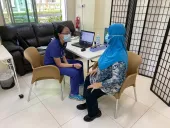
Asia's healthcare industry turns to big data to streamline services
China completed five data centres that exclusively collect citizens’ health profiles.
Asia’s healthcare industry is increasingly relying on big data to gain deeper insights into patients and analyse treatments, according to a report by ACCESS Health International and Finn Partners Asia.
One of the biggest developments in the region to date is the completion of the data centre in China’s Guizhou province that was the final piece of the puzzle to complete China’s national health data network. It is one of the five data centers across the country that collect detailed health profiles for citizens.
According to the report, researchers use data from digital and medical technologies through basic data analytics using statistical inference. “Researchers have also used computer simulations to test hypotheses about the efficacy of certain health interventions. Machine learning methods are also beginning to take hold in the medical and health industry,” it said.
Machine learning and artificial intelligence are moving data-driven health research beyond simple testing of hypothesis into predictions.
The report cited Wellthy Therapeutics, is an AI-powered mobile application designed in India, to help Type-2 diabetes patients address lifestyle changes through research generated from personalised data. Another AI-powered medical device is Ping An Good Doctor from China that can also produce high-quality health data that inform research on the effectiveness of certain health interventions.
Turning to social media
Researchers have also made use of user posts on social media to monitor adverse drug reactions amongst patients. For instance, researchers in Korea’s Yonsei University are developing computer games that can detect a child’s risk of cognitive and emotional problems. In Singapore, a health technology startup, RingMD, uses wearable devices to collect patient’s heart rate and body temperature data.
“Singaporean researchers are also exploring how genomic information and medical records can feed into precision medicine research, which means providing personalised medicine best suited for the patient,” the report said.
AI is also being utilised outside social media with the Smart Health-Assist program in Singapore developing at-home sensors to monitor patients, and researchers are exploring possibilities to incorporate sensor data with other forms of medical, economic, geographical or personal identification information.
The report also noted that in China, disease-specific data aggregation platforms are on the rise. The China Kidney Disease Network, for instance, brings together different sources of data on kidney diseases, whilst with large digital ecosystem creators such as Health Catalyst enter Asia Pacific, patients in remote areas will be connected to clinical trials across the world to access innovative treatments.













 Advertise
Advertise













